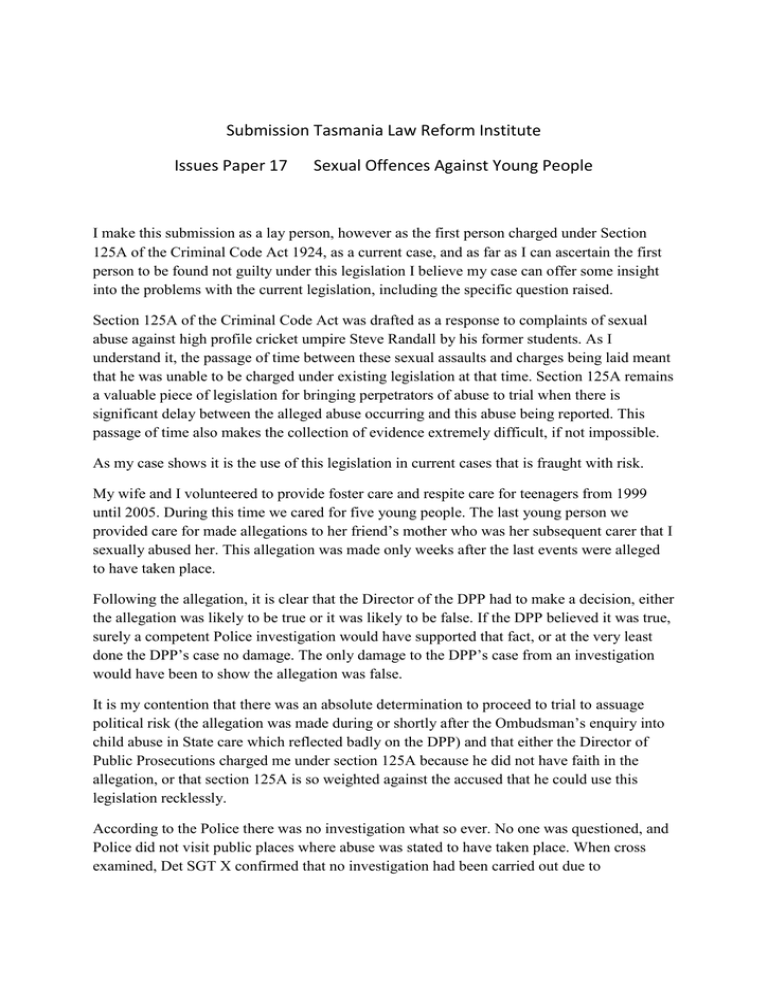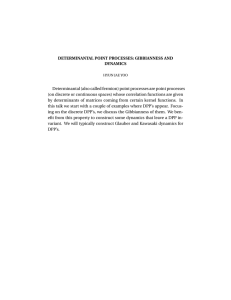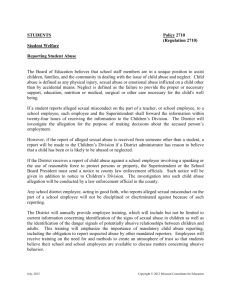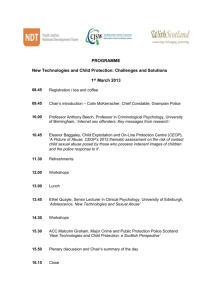
Submission Tasmania Law Reform Institute
Issues Paper 17
Sexual Offences Against Young People
I make this submission as a lay person, however as the first person charged under Section
125A of the Criminal Code Act 1924, as a current case, and as far as I can ascertain the first
person to be found not guilty under this legislation I believe my case can offer some insight
into the problems with the current legislation, including the specific question raised.
Section 125A of the Criminal Code Act was drafted as a response to complaints of sexual
abuse against high profile cricket umpire Steve Randall by his former students. As I
understand it, the passage of time between these sexual assaults and charges being laid meant
that he was unable to be charged under existing legislation at that time. Section 125A remains
a valuable piece of legislation for bringing perpetrators of abuse to trial when there is
significant delay between the alleged abuse occurring and this abuse being reported. This
passage of time also makes the collection of evidence extremely difficult, if not impossible.
As my case shows it is the use of this legislation in current cases that is fraught with risk.
My wife and I volunteered to provide foster care and respite care for teenagers from 1999
until 2005. During this time we cared for five young people. The last young person we
provided care for made allegations to her friend’s mother who was her subsequent carer that I
sexually abused her. This allegation was made only weeks after the last events were alleged
to have taken place.
Following the allegation, it is clear that the Director of the DPP had to make a decision, either
the allegation was likely to be true or it was likely to be false. If the DPP believed it was true,
surely a competent Police investigation would have supported that fact, or at the very least
done the DPP’s case no damage. The only damage to the DPP’s case from an investigation
would have been to show the allegation was false.
It is my contention that there was an absolute determination to proceed to trial to assuage
political risk (the allegation was made during or shortly after the Ombudsman’s enquiry into
child abuse in State care which reflected badly on the DPP) and that either the Director of
Public Prosecutions charged me under section 125A because he did not have faith in the
allegation, or that section 125A is so weighted against the accused that he could use this
legislation recklessly.
According to the Police there was no investigation what so ever. No one was questioned, and
Police did not visit public places where abuse was stated to have taken place. When cross
examined, Det SGT X confirmed that no investigation had been carried out due to
instructions from the DPP. He also stated that “it was an oversight” that no DNA testing was
done. I was required to give a DNA sample so was it is unlikely that it was an oversight.
Following my interview with the Police, Det Sgt X said that the Police knew the young
person was lying, but they “had to let the jury decide”. It was a simple process for the defence
to access the young person’s records so given that the Police knew she was lying why didn’t
the DPP request for this to be done?
Both the young person and her best friend who was an alleged witness had to change their
statements. The witness statement so varied from the accuser that the DPP did not provide it
to the jury. The Police asked the alleged witness did she see anything 3 times, and she said no
or shook her head on each occasion. It was only later in her statement that she was lead by the
police to say she witnessed abuse.
During the trial process it came to light that this young person had a documented mental
health history that showed she was a compulsive and pathological liar. (The placement
agency did not tell us she was under psychiatric care when she came to us for fear that we
would not provide care, and the psychiatric care ceased). The DPP did not have the young
person examined by a psychiatrist, and likewise would not allow my defence team to do it.
On the basis of the court transcripts and the video statements Dr Ian Sale concluded that the
young person had never suffered any sexual abuse at any time and that she was a fantasist
(this was without the benefit of her psychiatric record), and was prepared to give evidence to
that fact. The DPP abandoned the trial before he could give evidence.
In the case of the Tasmanian 12 year old child prostitute, that gave rise to this issues paper,
only one of the people who had sex with the child have been charged. Considering the unjust
and corrupt trial I was forced to endure this seems like a very odd response by the DPP, and
this has caused much disquiet within the community, as stated in the Executive Summary.
Prior to specifically answering the specific questions posed by Issue Paper 17 I would like to
briefly comment on section 4.2.11. By using section 125 of the Criminal Code Act in a
current case and as a consequence removing the State’s onus of proof, where evidence could
reasonably exist, this legislation already undermines the right to a fair trial.
Also in relation to alleged sexual offences against children prosecuted under section 125,
Crown prosecutor Mike Stoddart is on the public record as stating: “public interest should
overbear the right for fairness of trial.” The Mercury. July 29 2005.
On the basis of the above I will now provide an opinion on the specific questions posed by
Issues Paper No17.
In answer to questions 1 -9 (a) there is no need to change the current legislation.
Simply because a defence exists (in this case the mistake as to age defence) does not
mean a jury will automatically accept that defence.
This was Terry Martin’s defence and the jury did not accept it.
The Director of Public Prosecutions gave the advice that he could not prosecute
because the men who had sex with the child prostitute had a mistake as to age
defence, however this is not accurate. It is clearly recorded in appendix 1 that some
men had repeated sexual intercourse with this child, and had these men been brought
to trial it would have been up to the jury to decide whether these men could, or should
have been aware that they were have sex with a person under the age of consent.
Whilst I don’t agree with former Children’s Commissioner Nick (sic) Mason’s view
that everyone who rang the number in answer to the advertisement should be charged,
a case could easily have been made based on repeated calls to the number, where
these men were unable to account for their whereabouts at the time the alleged
offences took place and where unusual amounts of money withdrawn from their bank
accounts. On this basis it is not unreasonable for the community to expect more than
one person to be charged in relation to these offences.
In the light of the way I was treated, where the determination to proceed to trial
included prosecutor XXXX travelling to the home of the complainant (against DPP
policy) in an attempt to get her to return to trial, even though her mental health history
had been discovered and a not guilty verdict assured, it is very difficult to understand
Tim Ellis’ reluctance to charge anyone other than Terry Martin. It is even more
difficult to understand given the jury refused to accept Terry Martin’s mistake as to
age defence.
In regard to question 9 (b) maintaining a sexual relationship should be redefined so that,
provided at least one unlawful sexual act was committed in Tasmania, unlawful sexual acts
committed outside the State can be taken into account. However this legislation should only
apply in historic cases, or if used in current cases, following a reasonable investigation by all
State’s where the abuse is alleged to have taken place.
In regard to question 9 (c): Increasing awareness of child sexual abuse, and the damage this
abuse does to a child’s development, together with the willingness to expose and prosecute
abuse has lead to significant changes in community perception. Changing the wording of the
offence will not change the vehemence with which people who abuse children are viewed.
However it is reasonable that the phrasing of the legislation be aligned with other States,
particularly if the amendment sought in question 9 (b) is successful.
Anonymous 1





